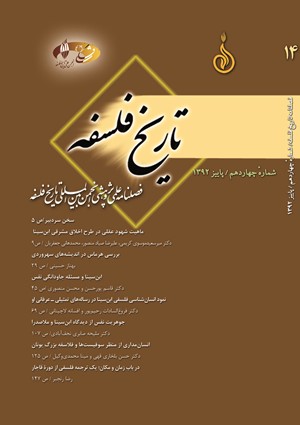بررسي هرماس در انديشه هاي سهروردي
محورهای موضوعی : Geneology of philosophical schools and Ideas
1 - دانشگاه بن آلمان
کلید واژه: هرمس اديان سهروردي نبوت اسلامي ,
چکیده مقاله :
در منابع طبري هرمس از نوادگان شيث فرزند حضرت آدم است و پس از آن دو، اولين فردي است که به نبوت رسيده است. در نظر سهروردي نيز تاريخ انديشه و فلسفه را بايد از هرمس آغاز کرد. درست است که از مهمترين وارثان سنت هرمسي در ميان مسلمانان را صوفيه نام بردهاند، همانطور که در بسياري از منابع چهرههايي مانند حلاج و سهروردي را در ميان اين سنت قرار دادهاند، علاوه بر اين، از راه فنون و دانشهايي مانند طب، نجوم، کيميا و مانند اينها نيز عقايد هرمسي به عالم اسلام راه يافته است، در اين ميان گروهي از نويسندگان، مورخان عارفان و حکماي مسلمان، هرمس را باني حکمت و علوم برشمردهاند. شهابالدين سهروردي و صاحب مکتب اشراق در عالم اسلام يکي از بزرگترين نمايندگان اين سنت تأويلي و رمزي اسلام و ايران است که علاوه بر تجليل از شخصيت هرمس تلاش ميکند وي را با اساطير ايراني پيوند زند. وي لقبهايي را برگرفته از اصطلاحات فلسفي خويش به هرمس نسبت ميدهد، از جمله طباع تام و خود را وارث حکمت هرمسي ميداند. نوشتار حاضر ميکوشد تا با بررسي هرمس در اسطوره هاي يوناني و پس از آن، نشان دهد که چگونه هرمس وارد نبوت اسلامي گرديده است.
In Tabari sources, Hermes is one of the grandchildren of Sheth, the son of Adam. After these two people, he was the first to become a prophet. In Suhrawardi’s view, the history of philosophy and thought begins with Hermes. The Sufis have been truly called the most important heirs to Hermetic tradition among Muslims. In many sources, the names of such figures as Hallaj and Suhrawardi have been placed among the names of the followers of this tradition. Moreover, Hermetic ideas have penetrated into the world of Islam through some sciences such as medicine, astronomy, alchemy, and the like. As a result, a group of Muslim writers, historians, gnostics, and philosophers have considered Hermes to be a pioneer in the field of wisdom and various sciences. Shahab al-Din Suhrawardi, the founder of Illuminationist philosophy in the world of Islam, is one of the representatives of this Iranian symbolic and esoteric, interpretive tradition, which, in addition to honoring Hermes’ character, tries to connect him with Iranian mythology. He attributes some names derived from his own philosophical terms to Hermes, such as tiba‘ tam (perfect natures). Suhrawardi considers himself an heir to Hermetic wisdom. Through a study of Hermes in Greek mythology and later sources, this paper intends to show how he entered the domain of Islamic prophethood.
